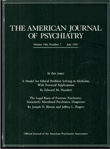The dexamethasone suppression test in residual schizophrenia with depression
Abstract
The authors administered the Carroll rating scale for depression to 100 patients with residual schizophrenia and found that 41 were also depressed. Of these 41 patients, 23 were given a dexamethasone suppression test; 7 (31%) failed to suppress cortisol. A matched control group, i.e., 23 patients with residual schizophrenia but without depression, suppressed cortisol normally after taking dexamethasone. The authors found no clinical differences between depressed patients with normal DST results and depressed patients with abnormal DST results.
Access content
To read the fulltext, please use one of the options below to sign in or purchase access.- Personal login
- Institutional Login
- Sign in via OpenAthens
- Register for access
-
Please login/register if you wish to pair your device and check access availability.
Not a subscriber?
PsychiatryOnline subscription options offer access to the DSM-5 library, books, journals, CME, and patient resources. This all-in-one virtual library provides psychiatrists and mental health professionals with key resources for diagnosis, treatment, research, and professional development.
Need more help? PsychiatryOnline Customer Service may be reached by emailing [email protected] or by calling 800-368-5777 (in the U.S.) or 703-907-7322 (outside the U.S.).



